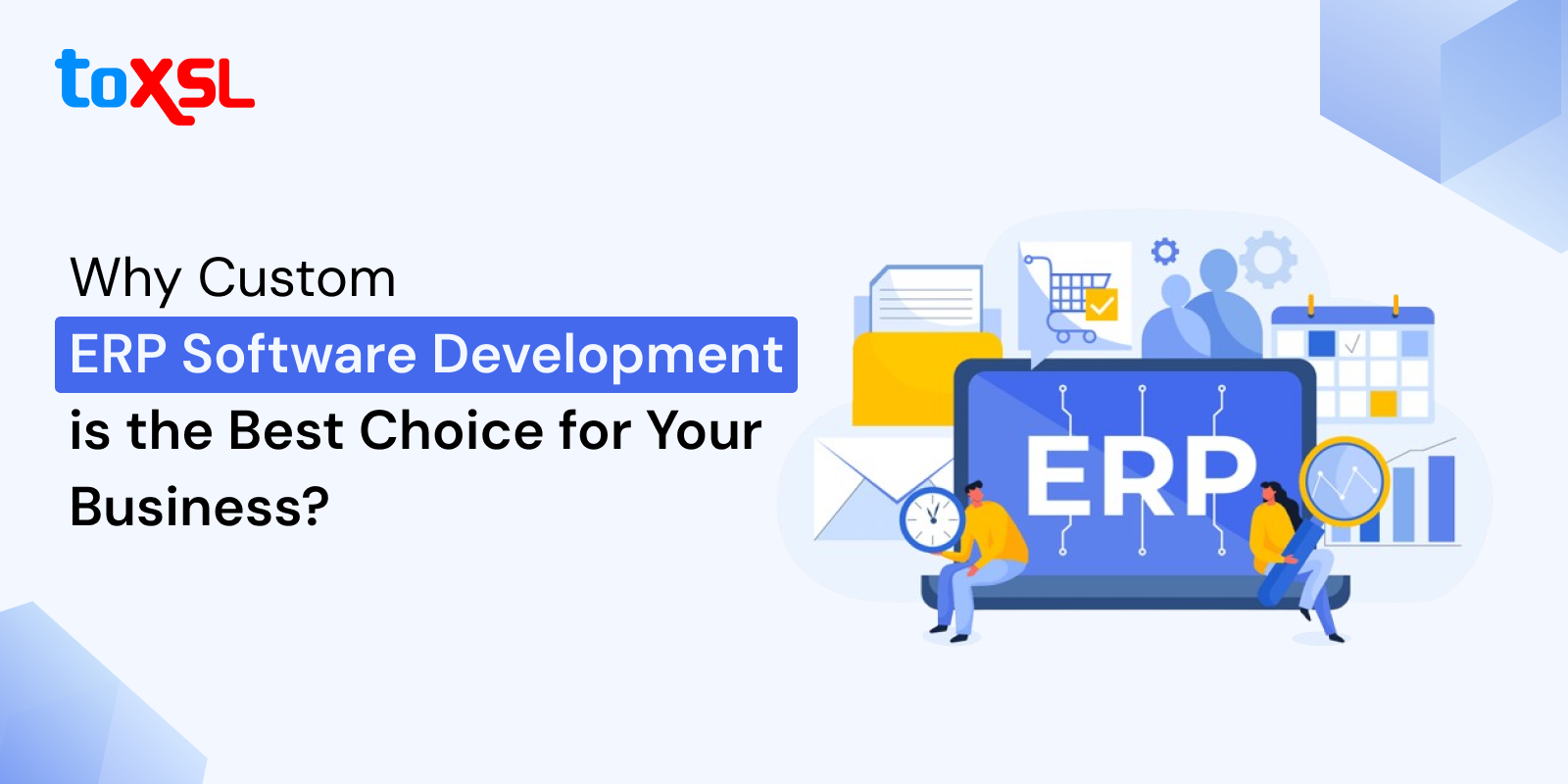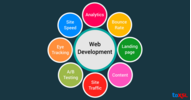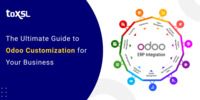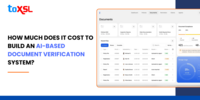- Apr 07, 2025
- ERP/CRM Applications
- 5042
Share this post on:

Do you want to run a business? But thinking about how to manage business operations seamlessly? Today, the business market is highly competitive, and staying ahead of the curve is crucial as well as challenging.
According to Statista, custom ERP software development is estimated to reach USD $65.28 billion by 2029. Large businesses hold39% of ERP market share; however, medium-sized businesses are expected to enhance at a rate of 9% between 2023 and 2032. Furthermore, 38% of businesses say that ERP has helped them improve their businesses by allowing them to handle changing customer demands with ease.
With the changing demand of businesses and needs of customers, opting for ERP software has become the need of the hour for today’s organizations. ERP software stores the real-time data and records across various departments within an organization. Management can look at the reports and analyze how well each department is performing and whether their work aligns with the business goals. ERP software helps businesses streamline operations and helps team members enhance efficiency.
Key Takeaways
Custom ERP Development: Tailored ERP solutions meet unique business needs, ensuring scalability, integration, and cost-effectiveness.
Types of ERP Software: Includes on-premises, cloud-based, and hybrid systems for diverse organizational needs.
Core Features: Integration, automation, data analysis, and financial management are essential for business efficiency.
Cost Range: Developing custom ERP software costs between $15,000 and $100,000, depending on features and complexity.
ToXSL Technologies: A trusted ERP development partner offering customized solutions to streamline operations.
Top Reasons to Invest in Custom ERP Development
Custom ERP software ensures that the company’s operations run smoothly and efficiently. But how do you know that custom ERP software is indeed the best software to streamline your operations? Here are a few reasons that tell you why businesses must choose custom ERP development software:
Business Requirements: Every business is unique and has specific requirements. Custom ERP development can easily fulfill the unique demands of businesses, including data fields, custom reporting, or financial processes. Custom ERP development companies understand your needs and ensure that their ERP solution meets your needs.
Increased Efficiency: Custom ERP software can help businesses enhance their efficiency by streamlining business processes. Nowadays, every business that wants to stay ahead of the curve must opt for ERP solutions.
Increased productivity: By opting for ERP solutions, businesses can easily enhance their productivity. As these systems help them reduce errors and eliminate paperwork by automating tasks. This helps businesses make better decisions and enhance productivity.
Enhanced Accuracy: Automated testing helps reduce mistakes made by people, which makes software more accurate. Also, building custom ERPs gives businesses a big advantage because they can create software that fits their specific needs and industry.
Customization: ERP shelf solutions are now available that can be adjusted to meet the unique needs of each business. This means companies can easily add, remove, or change features as needed. Customized ERP is important for business success because it allows businesses to create specific modules and features that fit their users' needs. These tailored solutions are essential for achieving success in business.
Scalability: As companies get bigger, they need their systems to keep up. So, while designing custom ERP software, it's important to think about how it can grow with the business. To do this well, designers should create a system that can easily add or change features and support more users. Developers should also choose technologies that can grow along with the company. By considering these points, businesses can ensure their ERP system will continue to meet their needs as they expand.
Integration: For easy access to all your company's data in one place, custom ERP systems with integrated apps allow you to review everything at once. When creating a unique ERP system, integration is necessary. Integration helps connect different parts of the ERP system and related software, as well as link to databases and other applications. This allows data to move between different system parts and ensures the ERP can access important information from other systems. Efficient operation of an ERP system relies on this integration, which also makes things faster since data can be transferred and retrieved without needing to enter it manually.
Cost-effectiveness: Comparing the costs of developing a custom ERP system to buying ready-made options can help businesses with limited budgets meet their complex software needs. This approach can lead to better management of long-term costs, saving money, time, and resources. With new technology available today, creating personalized ERP systems has become a smart investment. These systems are not only affordable but also efficient and easier to use, making them more adaptable for future growth.
Security: Custom ERP systems can keep your data safe and private because they are designed with security in mind. Strong security measures should be included at every step of creating these systems to protect sensitive information. These security measures include authentication, encryption, and access control. Also, regular checks or audits can quickly find and fix any potential risks.
Adaptability: Custom ERP development should always focus on flexibility, which is a key feature. This allows businesses to connect their new software with existing systems and adapt it for their specific needs. Custom ERPs also help businesses grow and change over time by making it easy to update the software as their needs evolve. Additionally, custom ERP development allows companies to use their current technology, like older systems, to smoothly transition to new software solutions. Moreover, custom ERP systems improve user experience by making it easy for users to navigate the system quickly and effortlessly.
Types of ERP Software
Every business is different. What they offer, how they operate, and how they communicate varies a lot. So, among all these, how do businesses know which is the best for them? Or which software should they opt for? Well, in this section, we will discuss the various types of ERP software:
On-premises ERP systems: These ERP systems are installed on organization's own servers. On-premises is a licensed version that is easily customizable. Also, it is easy to upgrade and help businesses streamline the business workflow.
Cloud-based ERP systems: These are internet-based systems, and businesses can easily connect with them using the internet. Cloud-based ERP is also known as SaaS (software-as-a-service) based on its ongoing billing model.
Hybrid ERP systems: Hybrid ERP is a combination of cloud-based ERP systems and on-premises ERP systems. The hybrid model is for the companies that have specific requirements and are highly secure.
What are the Core Features of a Custom ERP System?
Are you looking to develop a more efficient finance team? ERP software is designed to offer users a seamless user experience and automate financial operations. There are numerous features that companies must have in their business, and going deeper into the software makes you understand the concept of ERP software more and more. Let us now discuss the core features of a custom ERP system.
Integration: Large data can lead to inefficiencies, and businesses might forget or miss a few opportunities to grow or have some trouble in taking care of finances. ERP software gives businesses a central view of financial and business data that can be easily shared among departments in real time. ERP systems help businesses turn data into reports, helping companies reallocate resources or capitalize on new market opportunities.
Automation: ERP software can easily automate repeatable business tasks, including payroll, order processing, reporting, and invoicing, among others. Automation minimizes the time spent on manual tasks and decreases error. This helps businesses generate better revenue and enhance customer experience.
Data Analysis: We are living in an era where data is the king. There is data everywhere, and using it efficiently can help businesses achieve goals more efficiently. ERP software can help businesses analyze large data and help them achieve their goals easily. Furthermore, great data analysis can open doors of opportunities for businesses.
Financial Management: For every business, financial management is a critical task. It helps businesses plan, organize, and determine how they can make the best use of their finances. This helps leaders from all departments make great decisions related to capital projects, funding sources, and cash management.
Also Read: Custom ERP Software in Healthcare: A Comprehensive Guide
Cost to Develop Custom ERP Software Development
An ERP system integrates business into a single network and serves as a central hub for data and operations. Hence, the cost of custom ERP application development varies based on numerous factors. In general, the cost of custom ERP software development ranges from $15,000 to $100,000. However, numerous factors affecting the cost of ERP software include software complexity, custom features, technology stack, deployment model, integration, and data migration considerations, among others.
Conclusion:
In conclusion, we hope that now you understand the importance of ERP software for your organization. So, if you want to run your business more efficiently and seamlessly, choose ERP software. However, there is a lot of off-the-shelf ERP software available, but if you are looking to expand business, it is advised to opt for customized ERP software.
Customized ERP software gives you the liberty to include features and functionalities as per your unique business requirements. However, developing custom ERP/CRM software is a challenging process. So, it is advised to hire an ERP software development company with expertise in developing efficient ERP solutions. Ensure to check the portfolio of the company and see if they have expertise in the tools you want them to use in the development process.
ToXSL Technologies is a leading ERP software development, renowned for offering the best ERP solution to businesses worldwide. We have a team of developers who have developed software for the clients and have incorporated numerous functionalities and features. Get in touch with us today and streamline your business with our ERP software solutions.
FAQs
Q1: What is custom ERP software development?
A: Custom ERP software development involves building tailored enterprise resource planning solutions that match a business’s specific processes and requirements. Unlike off-the-shelf systems, custom ERP provides greater flexibility, scalability, and integration, ensuring smooth operations and improved efficiency across departments.
Q2: How does custom ERP improve business efficiency?
A: Custom ERP streamlines business processes by automating routine tasks, reducing manual errors, and enhancing real-time data access. It improves decision-making, productivity, and collaboration by aligning the system closely with unique business workflows and goals, ensuring optimal performance and resource management.
Q3: Is custom ERP software scalable for business growth?
A: Yes, custom ERP software is designed to grow with your business. It allows seamless integration of new modules, users, and features as your operations expand. This scalability ensures long-term value and eliminates the need for frequent software changes or replacements.











